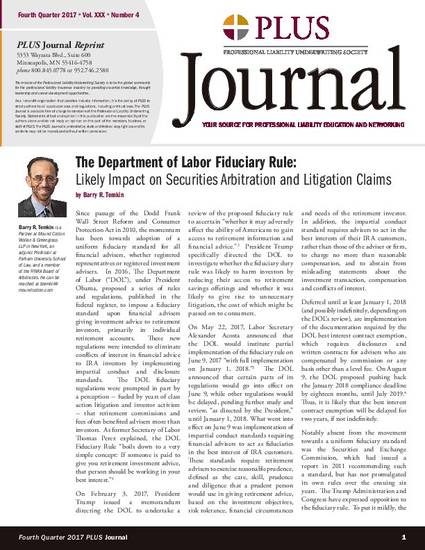
Article
THE DEPARTMENT OF LABOR FIDUCIARY RULE: LIKELY IMPACT ON SECURITIES ARBITRATION AND LITIGATION CLAIMS
Professional Liability Underwriting Society Journal
(2017)
Abstract
There is considerable uncertainty during the transition period pending DOL review of the Obama-era fiduciary rules for retirement accounts. During this period, advisers who do not receive level-fee compensation are held to the DOL impartial conduct standard for retirement accounts, but are not required to enter into best interest contracts for commission-based compensation. Under these impartial conduct standards, advisers are required to make recommendations in the retirement investor’s best interest, charge reasonable compensation, and avoid misleading statements. Additional requirements, including the proposed best interest contract requirement, and web-based disclosure are deferred to July 2019 and are under review by the DOL. An additional wildcard, as if one was needed, involves what role, if any, the SEC elects to assume and whether the Commission accepts Secretary Acosta’s invitation to participate in the regulatory process.
Up to this year, the momentum has been toward adoption of a fiduciary standard and it remains to be seen whether the current DOL under Secretary Acosta has the motivation to quell that trend. In the interim, the DOL impartial conduct standards are likely to result in more litigation and arbitration, and a higher success rate for investors’ representatives. If and when the BIC exception goes into effect, these claims will include breach of contract. Even under the impartial conduct standards in effect now, these additional claims may include and be based upon a variety of theories, including, (a) “reverse churning” in which fee-based accounts are utilized for low-activity customers; (b) failure to properly document a rollover from an ERISA account to a fee-based IRA; (c) firm compensation based on quotas and bonuses which create incentives contrary to the customer’s interest; (d) compensation grids which incentivize advisers to engage in more active trading; (e) purchase of class A mutual funds or other securities with front-end commissions which are subsequently moved into an advisory account.
As mentioned, an increase in the number and types of claims can be anticipated with the advent of fiduciary rules. Whether and to the extent the Best Interest Contract exemption takes effect will become apparent as the implementation date approaches.
Keywords
- dol fiduciary rule,
- fiduciary standard,
- securities regulation
Disciplines
Publication Date
Fall October 6, 2017
Citation Information
Barry R. Temkin. "THE DEPARTMENT OF LABOR FIDUCIARY RULE: LIKELY IMPACT ON SECURITIES ARBITRATION AND LITIGATION CLAIMS" Professional Liability Underwriting Society Journal Vol. XXX (2017) Available at: http://works.bepress.com/barry_temkin/53/
